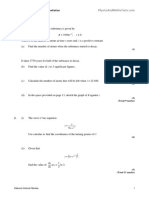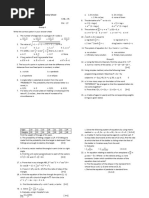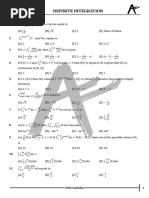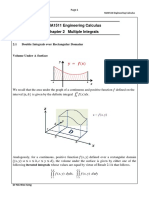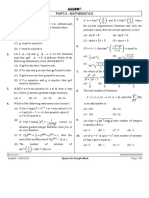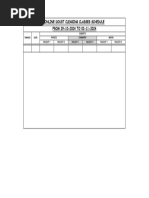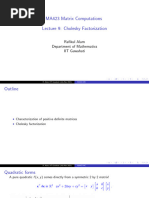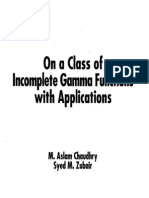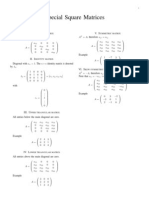Definite Integrals .
Definite Integrals .
Uploaded by
Annie JamesCopyright:
Available Formats
Definite Integrals .
Definite Integrals .
Uploaded by
Annie JamesCopyright
Available Formats
Share this document
Did you find this document useful?
Is this content inappropriate?
Copyright:
Available Formats
Definite Integrals .
Definite Integrals .
Uploaded by
Annie JamesCopyright:
Available Formats
Definite Integrals Test Attempt all Questions Total: 120
1. The integral ∫ equals
a. ( ( )) b. ( )
√ √
c. ( ( )) d.
√
2. The value of ∫ , where [t] denotes the greatest integral less than or equal to t, is
[ ] [ ]
a. b.
c. d.
3. The value of ∫ dx is
a. b.
c. 0 d.
4. The value of∫ dx is
a. b.
c. 4 d.
5. The value of integral ∫ dx is
a. √ b. 2 (√
c. √ d. (√
6. The integral ∫ dx equals
a. b.
c. d.
7. The value of ∫ dx is
a. b.
c. log 2 d. log 2
8. Let p (x) be a function defined on R such that = 1, p’ (x) = p’ (1 – x), x [0,1], p(0) = 1 and p(1) = 41 then, ∫
a. √ b. 21
c. 41 d. 42
9. If F (x) = f(x) + f ( ), where f(x) = ∫ dt then F(e) is equal to
a. 1/2 b. 0
c. 1 d. 2
10. ∫ dx is equal to
a. ∫ dx b. ∫ dx
c. ∫ dx d. ∫ dx
11. ∫ dx is equal to
a. b.
c. 0 d.
12. The value of the integral ∫ equals
√ √
a. b.
√ √
c. d.
Alpha Mathematics Classes Contact: 9666852331
Definite Integrals Test Attempt all Questions Total: 120
13. 2 2023 2 3 2024 ∫
Let a be the sum of all coefficients in the expansion of (1 – 2x + 2x ) (3 – 4x + 2x ) and b = ( ) If the equation
2 2
cx + dx + e = 0 and 2 bx + ax + 4 = 0 have a common root, where c,d, e R, then d : c : e equals
a. 4 : 1 : 4 b. 2 : 1 : 4
c. 1 : 2 : 4 d. 1 : 1 : 4
14. √ √
Let f : R R be a function defined by f(x) and g(x) = f(f(f(f(x)))). Then, 18 ∫ dx is equal to
a. 42 b. 36
c. 39 d. 33
15. If the value of the integral ∫ ( ) dx = then the value of a is
a. b.
c. 3 d. 2
16. For 0 < a < 1, the value of the integral ∫ is
a. b.
c. d.
17. If ∫ dx = ( ) , then is equal to
a. – 21 b. 21
c. 0 d. 19
18. If f : R be contionues function satisfying ∫ ) sin x dx + ∫ cos x dx = 0 then the value of is
a. √ b. √
c. √ d. – √
19. Let . If ∫ dx =
√
, then is equal to
√ √
a. 4 b. 2
c. √ d. 2√
20. The value of ∫ dx is equal to
a. √ √ b. √ √
c. √ √ d. √ + √
21. If ∫ dx = √ + √ , where are integers, then is equal to …
√ √
22. Let f(x) = min {[x – 1], [x – 2+, … , *x – 10]} where [t] denotes the greatest integer t Then ∫ ∫ dx +
∫ equal to
23. Let be a differentiable function satisfying f(x) = √
( )d x > 0 and f(1) = √ . If y = f(x) passes through the point
√
∫
( is equal to ….
24. If n (2n + 1) ∫ = 1177 ∫ dx then n N is equal to ….
25. Let f be a twice differentiable function on R. If f’( 0) = 4 and f(x) + ∫ = (e2x + e – 2x) cos 2x + x, then
(2a + 1)5 a2 is equal to …
26. Let a = ∫ ( ) dx for every n . Then the sum of all the elements of he set { n : an (2,30)} is ..
n
27. The integral √
is equal to …
∫ √
28. The value of the integral ∫ ( ) dx is equal to …
29. Let f(x) = max ,|x + 1| , |x + 2| , … |x + 5|- then ∫ equal to …
30. The value of b > 3 for which 12 ∫ dx = ( ) is equal to ….
Alpha Mathematics Classes Contact: 9666852331
Definite Integrals Test Attempt all Questions Total: 120
Alpha Mathematics Classes Contact: 9666852331
You might also like
- Pchem11e Toolkit 04Document1 pagePchem11e Toolkit 04Lê Anh MịnhNo ratings yet
- Maths XII ModelDocument15 pagesMaths XII ModelQuantum HeatNo ratings yet
- Math Mcqs Chap 3Document3 pagesMath Mcqs Chap 3mohsin shahbazNo ratings yet
- Stuff You MUST Know Cold: Ap CalculusDocument2 pagesStuff You MUST Know Cold: Ap CalculusChen LiNo ratings yet
- Calculus II Questions For Exit-ExamDocument6 pagesCalculus II Questions For Exit-ExamYasir Ismael100% (1)
- Worksheet CHAPTER - 7 DEFINITE 16-10-23Document3 pagesWorksheet CHAPTER - 7 DEFINITE 16-10-23hotah61811No ratings yet
- Bstat Bmath Uga 2021Document7 pagesBstat Bmath Uga 2021monicahar641No ratings yet
- ISI BStat-BMath-UGA-2021Document7 pagesISI BStat-BMath-UGA-2021vorarajveer78No ratings yet
- BStat BMath UGA 2021Document7 pagesBStat BMath UGA 2021HimanshuNo ratings yet
- C3 Differentiation - Basic DifferentiationDocument8 pagesC3 Differentiation - Basic DifferentiationNafisa RulesNo ratings yet
- BStat-BMath-UGA-2021 ISIDocument7 pagesBStat-BMath-UGA-2021 ISIMadhav MaheshwariNo ratings yet
- Maths Class Xii Chapter 07 Integrals Practice Paper 07Document3 pagesMaths Class Xii Chapter 07 Integrals Practice Paper 07kumaravelsuganthi00% (1)
- XII Pre BoardDocument7 pagesXII Pre BoardRohith SivakumarNo ratings yet
- Mcqs - CH # 3: F.SC Part 2: Choose The Correct AnswerDocument3 pagesMcqs - CH # 3: F.SC Part 2: Choose The Correct AnswerMohammad AshfaqNo ratings yet
- Calmphook SETSDocument109 pagesCalmphook SETSSAURAB GyawaliNo ratings yet
- Science Deep Chemistry Topics Very DeepDocument10 pagesScience Deep Chemistry Topics Very DeepSahil TandonNo ratings yet
- IntegralsDocument230 pagesIntegralsAnkitNo ratings yet
- ContinutyDocument5 pagesContinutyzainabkn7890No ratings yet
- BC Cram SheetDocument2 pagesBC Cram Sheetck1110581No ratings yet
- BC Cram Sheet PDFDocument2 pagesBC Cram Sheet PDFSteven LimantoroNo ratings yet
- Isi Mma Pca Csa 2021Document7 pagesIsi Mma Pca Csa 2021Abhay Raj SinghNo ratings yet
- Cblemapu 15Document7 pagesCblemapu 15midhu9aNo ratings yet
- MATHSDocument6 pagesMATHSsamadamir2003No ratings yet
- MA Sample PaperDocument7 pagesMA Sample Paperdummymailfor1dayNo ratings yet
- Functions PracticeProblemsDocument5 pagesFunctions PracticeProblemsRaghuveer GNo ratings yet
- Definite Integration TNDocument12 pagesDefinite Integration TNPrashantcool1999No ratings yet
- Definite Integrals and Its Applications: Genius TutorialsDocument4 pagesDefinite Integrals and Its Applications: Genius TutorialssatyajitadrijaNo ratings yet
- 2014 Lecture 006Document32 pages2014 Lecture 006eouahiauNo ratings yet
- 2013 Lecture 006Document32 pages2013 Lecture 006eouahiauNo ratings yet
- RSM MockDocument5 pagesRSM MockShrajal Kushwaha100% (1)
- Class 12 Maths Pre board-II 2023Document4 pagesClass 12 Maths Pre board-II 2023vvs.gandhi. SREENIVASAPERUMALNo ratings yet
- Math 12th Full Book Version 7Document2 pagesMath 12th Full Book Version 7kru8872No ratings yet
- ME 2000 Unsolved PDFDocument12 pagesME 2000 Unsolved PDFSathya ThyaguNo ratings yet
- Assignment IiDocument2 pagesAssignment IiSubham KalwarNo ratings yet
- Xi Business Math Set 1Document4 pagesXi Business Math Set 1aashirwad2076No ratings yet
- Applications of Derivatives: X A X FX X X XDocument28 pagesApplications of Derivatives: X A X FX X X XShashankNo ratings yet
- Sheet - 01 - Definite IntegrationDocument10 pagesSheet - 01 - Definite IntegrationDamoh Ka DadaNo ratings yet
- Sheet - 01 - Definite Integration NJ - 247Document10 pagesSheet - 01 - Definite Integration NJ - 247harshitparmarjhs07No ratings yet
- MA1511 Chapter 2Document14 pagesMA1511 Chapter 2Kang Le LimNo ratings yet
- Class-XII-Maths-QP-KV NERISTDocument6 pagesClass-XII-Maths-QP-KV NERISTBot1234No ratings yet
- A × B C × B) C, When The Answer Is A Scalar. The Other Possibility A × (B C) Does Not MakeDocument8 pagesA × B C × B) C, When The Answer Is A Scalar. The Other Possibility A × (B C) Does Not MakeNatkhatKhoopdiNo ratings yet
- Class Test 01-03-07-23Document3 pagesClass Test 01-03-07-23Ansh GuptaNo ratings yet
- Application of Integrals by Khozhiakbar KhudoiarovDocument9 pagesApplication of Integrals by Khozhiakbar KhudoiarovkkhudoiarovNo ratings yet
- Department of Mathematics and Natural Sciences MAT 120 Midterm Assignment SPRING 2021 SET: 14Document4 pagesDepartment of Mathematics and Natural Sciences MAT 120 Midterm Assignment SPRING 2021 SET: 14Life SummerNo ratings yet
- Definite IntegrationDocument6 pagesDefinite Integrationsamvarjain2006No ratings yet
- TMA1101 - Topic 06 DefiniteIntegrals+IntegrationApplicationsDocument8 pagesTMA1101 - Topic 06 DefiniteIntegrals+IntegrationApplicationsVenggaNo ratings yet
- Screenshot 2024-08-02 at 14.20.26Document4 pagesScreenshot 2024-08-02 at 14.20.26shrey12.srivastavNo ratings yet
- 1223Document6 pages1223mohamed634jNo ratings yet
- INPS-DEFINITE INTEGRAL-Study-MaterialDocument16 pagesINPS-DEFINITE INTEGRAL-Study-MaterialSps BloggerNo ratings yet
- Homework 3: Complex AnalysisDocument2 pagesHomework 3: Complex AnalysisBudoor AlmosharafyNo ratings yet
- Exercises Set 3. Schrödinger EquationDocument5 pagesExercises Set 3. Schrödinger EquationGabo S-bvNo ratings yet
- Math Unit Test 2Document2 pagesMath Unit Test 2divya shreeNo ratings yet
- Question8 - Integral CalculusDocument3 pagesQuestion8 - Integral CalculusSnehasish DasNo ratings yet
- Rellation and Funtion, Limit Derivatives Question PaperDocument2 pagesRellation and Funtion, Limit Derivatives Question Paperriteshbari8444No ratings yet
- 125 Class TestDocument2 pages125 Class Testjaiswal23456No ratings yet
- c3 Differentiation - Basic DifferentiationDocument8 pagesc3 Differentiation - Basic DifferentiationRaghvi AryaNo ratings yet
- Final Sample ProblemsDocument6 pagesFinal Sample ProblemsreqaerNo ratings yet
- Tutorial On The Dirac Delta Function and The Fourier TransformationDocument4 pagesTutorial On The Dirac Delta Function and The Fourier Transformationmcaglar35No ratings yet
- Complete CALCULASDocument6 pagesComplete CALCULASkushagrachoubisa98No ratings yet
- Moi CL Test1 SolnDocument6 pagesMoi CL Test1 SolnAnnie JamesNo ratings yet
- Probability Test 1 JEE MainsDocument2 pagesProbability Test 1 JEE MainsAnnie JamesNo ratings yet
- Online Doubt Clearing Classes Schedule FROM 29-10-2024 TO 03-11-2024Document1 pageOnline Doubt Clearing Classes Schedule FROM 29-10-2024 TO 03-11-2024Annie JamesNo ratings yet
- Shatadru Ghosh DurgapurPS Class 12Document32 pagesShatadru Ghosh DurgapurPS Class 12Annie JamesNo ratings yet
- Bengali Shonkor Character SketchDocument5 pagesBengali Shonkor Character SketchAnnie JamesNo ratings yet
- Qee 1Document26 pagesQee 1Annie JamesNo ratings yet
- Elementary SignalsDocument29 pagesElementary SignalsAngga BenningtonNo ratings yet
- Lect 9Document16 pagesLect 9TusharNo ratings yet
- MatheotmultiDocument34 pagesMatheotmultisalama alkaabiNo ratings yet
- Ps Tricks PPTDocument28 pagesPs Tricks PPTMihir MehraNo ratings yet
- Chapter 6 PPT Slides vs3Document22 pagesChapter 6 PPT Slides vs3Sherif Aly100% (1)
- DS321 Lip 2022 2023 L21Document5 pagesDS321 Lip 2022 2023 L21kareemkadrey02No ratings yet
- MA398 ScriptDocument115 pagesMA398 ScriptAngelito MogollonNo ratings yet
- On A Class of Incomplete Gamma Functions With Applications: M. Aslam Chaudhry Syed M. ZubairDocument6 pagesOn A Class of Incomplete Gamma Functions With Applications: M. Aslam Chaudhry Syed M. ZubairboyketteNo ratings yet
- Unit 5Document32 pagesUnit 5Dinesh TripathiNo ratings yet
- Special Square MatricesDocument1 pageSpecial Square MatricesRicardo Emilio AranaNo ratings yet
- 9.2 Notes 2DArray Challenges - WatermarkDocument11 pages9.2 Notes 2DArray Challenges - WatermarkATUL SHARMANo ratings yet
- Soalan Set 2 (Assignment Math)Document3 pagesSoalan Set 2 (Assignment Math)ayunabilah zaidNo ratings yet
- Finding Domain and Range of A Function G8Document27 pagesFinding Domain and Range of A Function G8kennethvilla07100% (1)
- OA NotesDocument62 pagesOA Notesrichie053No ratings yet
- Slides ChIV Bài 1. Giá Trị Lớn Nhất Và Nhỏ NhấtDocument23 pagesSlides ChIV Bài 1. Giá Trị Lớn Nhất Và Nhỏ Nhấtlehoangsand55No ratings yet
- (Maa 5.11) Definite Integrals - AreasDocument50 pages(Maa 5.11) Definite Integrals - AreasErwin EchaureNo ratings yet
- Assignment 1 Class 12Document5 pagesAssignment 1 Class 12latika bhallaNo ratings yet
- Graph TheoryDocument83 pagesGraph Theorygiancarlomorales703No ratings yet
- 3.1 Exponential FunctionsDocument19 pages3.1 Exponential FunctionsYukiC123No ratings yet
- (2.4-2.5) COMPOSITION - INVERSE FUNCTION For IBDocument21 pages(2.4-2.5) COMPOSITION - INVERSE FUNCTION For IBacorn anNo ratings yet
- Lap Inv 8Document1 pageLap Inv 8api-3821702No ratings yet
- Discrete Structures MCA CBCS 1-SEMDocument2 pagesDiscrete Structures MCA CBCS 1-SEMkgiridharreddy2022No ratings yet
- Chapter 02 (Solution of Algebraic & Transcendental Equation)Document24 pagesChapter 02 (Solution of Algebraic & Transcendental Equation)Imrul Hasan100% (1)
- Topic 10 Introduction To GraphDocument13 pagesTopic 10 Introduction To Graphعبدالرحيم اودينNo ratings yet
- Graph of Polynomial FunctionDocument36 pagesGraph of Polynomial FunctionArden CornelioNo ratings yet
- Linear Algebra Unit 2Document61 pagesLinear Algebra Unit 2Scout opNo ratings yet
- Complex Analysis and Conformal Mapping: C 2018 Peter J. OlverDocument84 pagesComplex Analysis and Conformal Mapping: C 2018 Peter J. OlverMonaNo ratings yet
- Lesson 6: The Exponentials : A. Exponential EquationDocument13 pagesLesson 6: The Exponentials : A. Exponential EquationVince Michael BugayongNo ratings yet
- Signal and SystemsDocument8 pagesSignal and SystemsPratik BhonkarNo ratings yet









